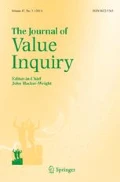Notes
These attempts and replies receive useful treatment in Österberg (1988).
Campbell (1974) points out flaws in two of them: Mack’s (1974) and Burkholder’s (1974). Kalin’s reply (1975: sec. 6), in an important paper, is unsatisfying in at least one respect: it rests, in part, on an understanding of ethical egoism that differs from the usual one, the one that makes ethical egoism parallel with, and thus a competitor with, other normative ethical theories. As Kalin defines ethical egoism, it “uses the concept ‘ought, all things considered’ rather than … ‘morally ought’” (Kalin, 1975: 341). Österberg’s reply (1988) to Campbell’s objection receives attention shortly.
Throughout this counterexample, “knows” means “knows or has good reason to believe.”
For two or three of the elements of this situation, I am indebted to a brief passage, used for purposes different from mine, in Österberg (1988: 94, lines 7–10).
In these remarks I am interpreting more than paraphrasing. For one thing, Mack and Campbell pin their statements not to the above argument itself, but to the more general form of it just mentioned.
An incidental point: As just indicated (in my remark about ethical egoists), climbing to the mountain peak is Mel’s besti option and preventing his climb is Nell’s besti option. Thus, their situation supports premise 1 of Campbell’s argument.
Here is one, discussed by Österberg (1988: 94–95): If, first, M morally ought to do X in S and N morally ought to prevent M from doing X in S, and second, each agent has her moral obligation independently of what the other agent does or will do, then it is logically possible that M does X in S and N prevents M from doing X in S. This premise, if substituted for 3, requires that we modify other premises in Campbell’s argument. And as Österberg observes, the modifications then damage that argument.
Note 7 is pertinent here. So too is the assumption that the version of 3 in question is not demonstratively flawed. It would be demonstrably flawed if substituting it for the original version of 3 forced us to make damaging changes to other premises.
This widely discussed principle owes its name to Williams (1965: 118).
Burkholder (1974: 653–654) makes a similar point about a “certain type of argument” (of his own devising) against ethical egoism, noting that Campbell’s argument is one variety of that type.
References
Baier, Kurt. 1965. The Moral Point of View, abridged ed. New York: Random House.
Baumer, William H. 1967. Indefensible Impersonal Egoism. Philosophical Studies 18 (5): 72–75.
Burkholder, L. 1974. How Not to Refute Ethical Egoism. Canadian Journal of Philosophy 3 (4): 653–657.
Campbell, Richmond. 1972. A Short Refutation of Ethical Egoism. Canadian Journal of Philosophy 2 (2): 249–254.
Campbell, Richmond. 1974. Replies to Mack and Burkholder on Ethical Egoism. Canadian Journal of Philosophy 3 (4): 665–671.
Kalin, Jesse. 1971. Baier’s Refutation of Ethical Egoism. Philosophical Studies 22 (5/6): 74–78.
Kalin, Jesse. 1975. Two Kinds of Moral Reasoning: Ethical Egoism as a Moral Theory. Canadian Journal of Philosophy 5 (3): 323–356.
Mack, Eric. 1974. Campbell’s Refutation of Egoism. Canadian Journal of Philosophy 3 (4): 659–663.
Österberg, Jan. 1988. Self and Others: A Study of Ethical Egoism. Dordrecht: Kluwer.
Quinn, Warren. 1974. Egoism as an Ethical System. Journal of Philosophy 71 (14): 456–472.
Schroeder, Mark. 2011. Ought, Agents, and Actions. Philosophical Review 120 (1): 1–41.
Williams, B.A.O. 1965. Ethical Consistency. Proceedings of the Aristotelian Society, supplementary vol. 39: 103–124.
Acknowledgments
For helpful discussions, suggestions and the like pertinent to this paper or to related topics, I thank Richmond Campbell, Chad Carmichael, David Estlund, Samuel Kahn, Luise Morton, Bruce Roig, Gary Varner, Paul Warren, and the anonymous referees.
Author information
Authors and Affiliations
Corresponding author
Additional information
Publisher's Note
Springer Nature remains neutral with regard to jurisdictional claims in published maps and institutional affiliations.
Rights and permissions
About this article
Cite this article
Tilley, J.J. On an Alleged Refutation of Ethical Egoism. J Value Inquiry 57, 533–542 (2023). https://doi.org/10.1007/s10790-021-09841-x
Accepted:
Published:
Issue Date:
DOI: https://doi.org/10.1007/s10790-021-09841-x

